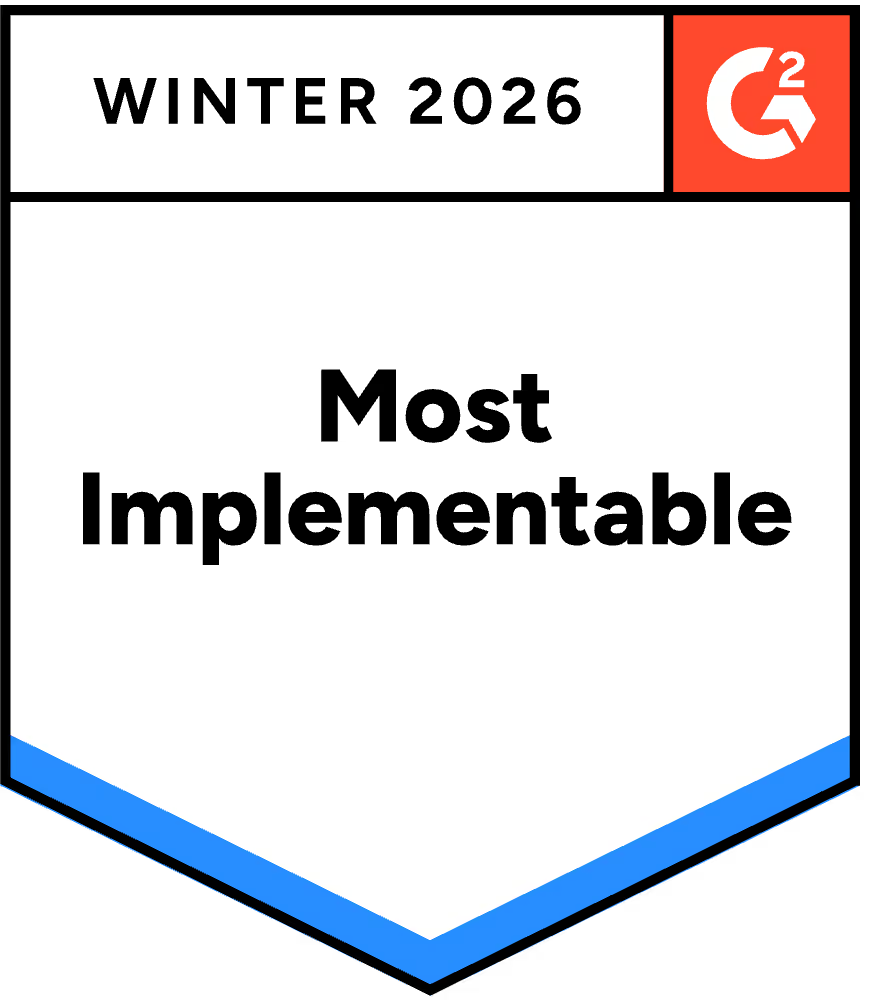Increase employee engagement with insight & creativity

It’s hard to overstate the importance of engagement to the long-term success and health of your organization. Even so, many companies focus on the link between engagement and retention, overlooking how it also drives productivity, work quality, and resilience amidst economic turbulence (1).
As a result, they fail to make engagement the priority it should be, which is likely the reason that only 21% of global employees say they’re engaged at work (2).
Part of the reason businesses may struggle to increase engagement is that they confuse engagement with happiness or satisfaction, which aren’t perfect equivalents. Engagement is an employee’s emotional, mental, and even physical commitment to their work. It’s about trust, meaning, and purpose. It is possible for an organization to have solid benefits, cohesive teams, and strong sales metrics and still have low levels of engagement.
To help you better position your team to create a more inspiring, purposeful workplace, we explore why engagement matters and how to track it effectively. We also draw on expert advice from a specialist to identify five core steps to strengthen engagement across your organization.
1. Microsoft WorkLab, 2023
2. Gallup, 2023
👟 Engagement surveys guide your next steps
Leapsome’s Surveys module automatically generates action plans based on the results.
👉 Learn more
Why is improving employee engagement important?
There’s a close relationship between employee engagement, retention, and productivity, highlighting how crucial engagement is to organizational resilience. According to a recent Gallup analysis, organizations with higher engagement levels saw an 81% decrease in absenteeism and an 18% drop in turnover. They also saw an 18% increase in productivity and a 23% rise in profitability.
Moreover, engagement positively impacts internal culture and community. An active, energized team is more likely to innovate, communicate, and collaborate effectively, which makes it easier for you to onboard, integrate, and retain new staff members.
Overall, high engagement levels can have a positive effect on:
- Productivity — When employees are interested in their work and feel a connection to what they are doing, it is much more likely they’ll do it well and be invested.
- Retention — Motivated employees that feel inspired by and passionate about their work may feel a deeper sense of commitment to their role and the organization, increasing the likelihood that they’ll stay long-term.
- Employee satisfaction — If employees are not satisfied with their work, interest, and enthusiasm will dwindle. Increasing engagement can make employees feel satisfied with their contributions, helping them feel more connected to their performance and the company. Since satisfaction plays such a large role in engagement, it’s important to include questions about it in your employee engagement surveys and track satisfaction scores alongside other metrics.
- Employee advocacy — Happy, committed employees are more inclined to express their feelings publicly on social media platforms like LinkedIn or review sites like Glassdoor. They also tend to be committed to improving their organization and willing to share constructive feedback internally.
- Customer satisfaction and quality of work — Employees who are engaged tend to do higher quality work, not only leading to better products and services but also to increased customer satisfaction and loyalty. They take pride in their work and go the extra mile to ensure that customers are satisfied. This can give the organization a competitive advantage.
- Learning and development (L&D) and innovation — Engaged employees are often more eager to participate in learning and development opportunities, and more likely to contribute innovative ideas and solutions. They care about the organization’s success and are more willing to think creatively and challenge the status quo, helping their company continuously improve and stay competitive.
🕜 Know what makes your employees tick
Leapsome Surveys are anonymous by default, so you can get to the heart of what motivates team members.
👉 Learn more
How to identify where engagement initiatives are not working

A wider range of metrics can give you a complete picture of organizational engagement
It can be frustrating when engagement initiatives don’t quickly translate into measurable increases in performance and retention. As a result, you may be concerned that it’ll be challenging to justify your efforts to leadership.
However, you may not be tracking the right indicators at the right time or seeing the full picture if you aren't relying on a broad enough set of metrics. Monitoring these four metrics will provide you with a clearer view of how your employees feel about work:
- Employee Net Promoter Score (eNPS) — The eNPS reveals how likely team members are to recommend your organization. Employees rate your company as a place to work on a Likert scale of one to ten. The resulting score provides insight into how satisfied they are currently feeling.
- Churn rate — This is the percentage of staff leaving your organization annually. A powerful employee engagement platform like Leapsome can also use survey data to predict future churn rates, empowering you to take preventative action.
- Results from pulse surveys — HR departments may conduct these brief surveys throughout the year, especially during periods of organizational turbulence and change. They allow leaders to take immediate action before small challenges turn into more endemic issues.
- Diversity, equity, inclusion (DEI) survey results — These surveys can show you how well your organization supports diverse talent and creates psychological safety for everyone. Questions typically shed light on how your company processes, leaders, and other employees contribute to creating a welcoming culture.
🤔 Wondering how to make leadership invest in employee engagement?
Leapsome helps increase productivity and reduce turnover, saving you thousands you might otherwise spend on recruiting and performance initiatives.
👉 Discover your ROI
5 core steps to more engaged employees

Once you’ve used the right metrics to identify internal opportunities for improvement, you can start planning your strategies accordingly. To help you get started on the right track, implement these five initiatives to improve engagement levels, modifying them based on your organizational needs.
1. Embark on regular employee listening tours
There’s a disconnect between the way leaders perceive engagement and how employees really feel. In fact, in Leapsome’s 2023 State of People Enablement report, we discovered that 95% of leaders believe their team members are somewhat engaged, while only 36% of staff agree. This suggests that many organizations have work to do when it comes to uncovering what employees really care about.
In a listening tour, leaders arrange short one-on-one meetings or asynchronous discussions to glean deeper insights into current employee sentiments, internal processes, and any other pressing issues. This can help companies overcome these types of perception gaps, especially if they want managers and senior employees across the business to understand their team members’ needs and adopt a more empowering leadership style.
When setting out on a listening tour, be sure to do the following:
- Share your plan and goals. Explain the reasoning behind the initiative and what you’ll do with your findings. For example, you might explain that the listening tour is a chance to discover what employees are passionate about and work together on ways in which you can create more enriching, meaningful opportunities for everyone.
- Learn as much as you can. Focus on asking questions that prompt honest answers rather than leading the discussion.
- Take notes. Maintain a record of any trends or patterns you notice in your conversations.
- Keep information anonymous. This helps create a safe space for employees to be open and candid. Also, consider offering employees reluctant to volunteer for the listening tour to participate in an anonymous survey. According to a 2014 study from the BMC Medical Research Methodology Journal, anonymous surveys lead to considerably higher response rates than non-anonymous surveys.
- Communicate what you uncovered. Consolidate your learnings in a central document and share them with key stakeholders and even the whole company during a monthly or quarterly all-hands meeting, for example.
⭐ Supplementing a listening tour with an anonymous engagement survey can help ensure all employee voices are heard, especially those that may not feel comfortable in a 1:1 meeting. After that, it’s best for stakeholders across your organization to collaborate on an employee engagement action plan — a set of strategic initiatives to make your workplace more motivating and meaningful for everyone.
2. Rethink your approach to performance reviews

High-performing organizations prioritize transparency, development, and collaboration in their review processes
We asked employee engagement expert Caitlin Kirwan what she thought about the connection between performance reviews and engagement.
“There’s clear evidence to show the link between leaders providing team members with regular feedback and increased levels of engagement,” says Kirwan. “Open and honest feedback is one of the foundations of employee engagement. Performance management needs to be an ongoing process rather than a discussion that takes place once or twice a year. The real benefits come when leaders weave constructive employee feedback into regular 1:1 discussions with their team members.”
The data agrees: In our 2023 report, we discovered that 77% of employees looking for new jobs cited their current performance review process as a major motivator for leaving.
Organizations that are aware of their own shortcomings surrounding performance reviews should consider these factors when revamping their processes:
- Transparency — Employees need to understand your organization’s true purpose and goals for the performance review process.
- Personal development — Let team members know how evaluations work as a tool for professional growth. Use them as opportunities to discuss personal goals and career aspirations and to identify new areas of development.
- Collaboration — Make assessments a two-way conversation, giving team members the freedom to ask questions, make suggestions, and prompt discussion.
🤔 Understand how employees develop throughout their tenure
Leapsome analytics features collect and analyze all performance review data so you can identify key trends in the employee lifecycle.
👉 Learn more
3. Encourage employees to develop & shine
Training and development play an important role in your team members’ professional choices. According to SHRM, 48% of employees say training opportunities had an impact on their current job decisions. This means offering a comprehensive learning and development program is a great way to upskill current employees and also retain and engage them longer-term.
As Caitlin Kirwan puts it, “Creating a culture of learning not only demonstrates that a company values their employees' growth and development, but it also improves business outcomes by increasing motivation and productivity. Investing in your team's learning and development is a surefire way to build a loyal and engaged workforce.”
The way in which you approach these upskilling opportunities is especially important. Offering occasional access to courses, webinars, and live sessions isn’t enough. Team members also need:
- Input into the method and content of their training materials so that it feels relevant to their roles and career paths.
- The chance to utilize these new skills by taking on new responsibilities in projects over time and learning by doing.
- Autonomy over how they put their skills to use, which instills motivation and confidence. In fact, a 2011 academic study uncovered that autonomy can increase job satisfaction and productivity among employees.
4. Establish a transparent compensation & promotion framework

Compensation transparency means you’re ready and willing to answer employee questions about promotions and pay
Unsurprisingly, over three-quarters of the respondents in our 2023 report said compensation is a major reason they’re looking for new jobs. Knowing this, companies may make adjustments to their compensation and benefits packages and offer promotions and incentives throughout the year to hold onto their best talent. However, those measures alone won’t result in more engaged, motivated team members.
Employees are also looking for greater transparency around pay and promotion practices, which involves:
- A clear, up-to-date compensation philosophy that outlines specific pay bands and explains how certain roles relate to industry benchmarks.
- Anticipating questions around compensation and promotion and being ready with answers, especially as laws around pay transparency change.
- Communicating when you’ve made updates to your compensation and promotion policies so employees don’t feel left in the dark and understand that everything is legitimate and fair.
📈 Use software to make data-informed compensation and promotion decisions
Leapsome’s Compensation module syncs with Goals, Reviews, and Learning to help you stay consistent and avoid unconscious bias.
👉 Book a demo
5. Prioritize an enjoyable environment & work-life balance
Organizations that prioritize work-life balance understand there’s no universal approach to creating an environment where the personal and the professional can peacefully coexist and intersect. Still, finding ways to create more work-life balance with remote and hybrid work or flexible working arrangements is worth the result: In a 2022 survey, 78% of employees said these kinds of changes improved their overall well-being.
Beyond a healthy and full life outside of work, the 40 hours spent at work should also be a positive and enriching experience for employees. One way to do this is to regularly recognize great work.
According to Caitlin Kirwan: “Genuine employee recognition is one of the most powerful things that boosts engagement. Employees need to be shown that their work is valued and that their contribution is making a difference.” Kirwan goes on to say, “Employees need to feel appreciated and respected. This is achieved by clearly showing how each team member's contributions link back to the bigger picture — demonstrating how their daily work fits into the company's strategy and objectives.”
To that end, organizations looking to update their work-life balance policies can:
- Encourage regular 1:1 meetings between managers and direct reports. This is an opportunity for managers to support team members, talk about current goals, discuss obstacles to progress, brainstorm solutions, and overcome bottlenecks.
- Create a dedicated channel for praise and recognition. With Leapsome’s Instant Feedback module, colleagues can publicly celebrate successes and shout each other out based on core skills and competencies.
- Train team leaders to be better coaches. The best managers give consistent feedback and know how to make both praise and constructive criticism specific and actionable.
- Offer flexible schedules. Giving employees the freedom to set their own hours means they can design their work routine around their personal schedules, not the other way around.
Increase employee engagement & watch your business thrive
Engagement isn’t a one-and-done affair. Business priorities evolve, employees come and go, and market conditions fluctuate, which means organizations need long-term strategies in place to stay resilient and weather these changes.
With the prospect of updating your internal research, performance management, and compensation processes, your current tech stack might not be flexible enough to cope. You may rely on multiple single-purpose tools that don’t interact smoothly, or perhaps you depend on a single, all-in-one platform that’s not user-friendly.
These are just some of the reasons why companies turn to Leapsome. Our holistic people engagement platform allows you to conduct engagement and pulse surveys, lead thorough performance reviews, and make unbiased compensation and promotion decisions. All of the above helps achieve ongoing improvement in performance, retention rates, and lower churn within your organization, no matter the external conditions.
🧗 Ready to see your engagement rates climb?
Leapsome can help you measure and improve engagement to create a more energizing work environment.
👉 Book a demo
Related articles
Back to the blogReady to transform
your People operations?
Automate, connect, and simplify all HR processes across the employee lifecycle.
.webp)
.webp)
 Request a demo today
Request a demo today





.jpg)

























